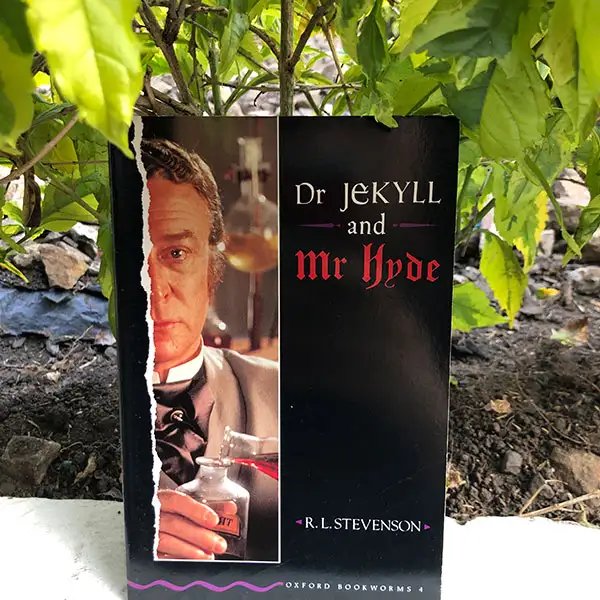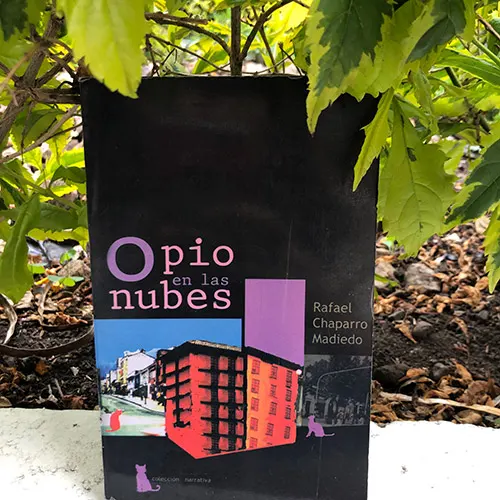Descripción
Libro Dr. Jekyll and Mr. Hyde (libro en inglés). Sinopsis libro, reseña libro. Strange Case of Dr Jekyll and Mr Hyde is a gothic novella by the Scottish author Robert Louis Stevenson. The work is also known as The Strange Case of Dr. Jekyll and Mr. Hyde, Dr. Jekyll and Mr. Hyde, or simply Jekyll & Hyde. It is about a London lawyer named Gabriel John Utterson who investigates strange occurrences between his old friend, Dr Henry Jekyll, and the evil Edward Hyde. The novella’s impact is such that it has become a part of the language, with the very phrase «Jekyll and Hyde» coming to mean a person who is vastly different in moral character from one situation to the next. Libro Dr. Jekyll and Mr. Hyde (libro en inglés).






Jeffrey Keeten –
”It came about that Edward Hyde was so much smaller, slighter, and younger than Henry Jekyll. Even as good shone upon the countenance of the one, evil was written broadly and plainly on the face of the other. Evil besides (which I must still believe to be the lethal side of man) had left on that body an imprint of deformity and decay. And yet when I looked upon that ugly idol in the glass, I was conscious of no repugnance rather of a leap of welcome.
This too, was myself.”
photo Jekyll-mansfield_zps5229ba58.jpg
Richard Mansfield was mostly known for his dual role depicted in this double exposure. The stage adaptation opened in London in 1887, a year after the publication of the novella. (Picture 1895).
Dr. Henry Jekyll is a brilliant man who in the course of trying to understand the human psyche has turned himself, with tragic results, into a guinea pig for his experiments. He has unleashed a power from within that is turning out to be too formidable to be properly contained. This book was released in 1886 and at first none of the bookshop wanted to carry the book because of the subject matter, but a positive review had people flocking to the stores to read this sinister tale of hubris overcoming reason.
photo FirstEdition_zpsdd0290f1.jpg
The American first edition is the true first edition because it preceded the London edition by three days
The timing was perfect for releasing such a tale. The Victorian society was struggling with the morality that had been imposed upon them by the previous generation. They were embracing vice. Many men of means living in London now found themselves hearing the siren song of pleasures available on the East End. They could be as naughty as they wanted and safely leave their depravity on that side of town before they return to the respectable bosom of their family and careers. They were struggling with the dual natures of their existences. The thunder of the church and the faces of their sweet families made them feel guilty for their need to drink gin in decrepit pubs, smoke opiates in dens of inequity, consort with underage whores, and run the very real risk of being robbed by cutthroats. This walk on the wild side also allowed them the privilege of feeling completely superior to all those beings providing their means of entertainment.
Jekyll as it turns out is no different. He relishes the adventures of his other persona even as he feels the mounting horror of losing control of this other self he calls Mr. Edward Hyde.
Furthermore, his creation has no loyalty.
”My two natures had memory in common, but all other faculties were most unequally shared between them. Jekyll (who was composite) now with the most sensitive apprehensions, now with a greedy gusto, projected and shared in the pleasures and adventures of Hyde; but Hyde was indifferent to Jekyll, or but remembered him as the mountain bandit remembers the cavern in which he conceals himself from pursuit.”
photo SpencerTracy_zpsbf091d68.jpg
Spencer Tracy plays Dr. Jekyll and Mr. Hyde in 1941.
Unfortunately indifference becomes more personal, more brutal in nature, as Hyde becomes more and more a caged animal who does not want to have to embrace the pretenses of Jekyll’s respectable position.
”The hatred of Hyde for Jekyll was of a different order. His terror of the gallows drove him continually to commit temporary suicide, and return to his subordinate station of a part instead of a person; he loathed the necessity, he loathed the despondency into which Jekyll had fallen, and he resented the dislike which he was himself regarded.”
The tincture that has so far allowed Jekyll to contain Hyde is needing to be doubled and tripled to give Jekyll some modicum of control over his deviant nature. Jekyll contacts every apothecary he knows trying to find more of the solution he needs only to discover that the original batch that he used to make his “grand discovery” with must have been tainted with a foreign substance unknown to any of the suppliers. This foreign substance, unfortunately, is the ingredient that made the emergence and the restraint of Hyde possible.
Dire circumstances indeed.
Men who normally did not read novels were buying this book. I believe they were looking for some insight into their own nature maybe even some sympathy for their own urges. They made a book that quite possibly could have been thought of as an entertaining gothic novel into an international best seller. New generations of readers are still finding this book essential reading. Even those that have never read this book know the plot and certainly know the names of Jekyll and Hyde. It has inspired numerous movies, mini-series, comic books, and plays. It could be argued that it is one of the most influential novels on the creative arts.
It was but a dream.
Robert Louis Stevenson was stymied for a new idea. He was racking his brain hoping for inspiration.
”He had his names for the agents of his dreams, his whimsical alter ego and writing self. Stevenson referred to these agents, it pains me to admit, as ‘the little people’ and the ‘the Brownies.’ His hope was that they would supply him with marketable tales.”
photo RLS_zps6bcfff23.jpg
RLS
It came to him in a nightmare that had him screaming loudly enough to wake the whole household.
It was a gift from the depths of his mind, maybe an acknowledgement of his own dark thoughts, his own darkest desires.
He wrote the nightmare down on paper feverishly over ten days. When he read the final draft to his wife, Fanny, her reaction was not what he expected. She was cold to the tale, completely against publishing such a sensationalized piece of writing. They argued, thin skinned to any criticism as most writers are especially when it is a complete repudiation of a piece of writing he was particularly proud of; Stevenson, in a moment of rage, tossed the whole manuscript in the fireplace.
Be still my heart.
There is no arguing with success of this magnitude, but I can’t help but wonder what was in that first draft. If there is a criticism of this novel it would be for the restrained nature in which it is presented. Did Stevenson just let it all go? Did he give us more elaborate details of Hyde’s excursions? Was Jekyll’s glee in Hyde’s adventures more fully explored?
I understand Stevenson was a fiery Scot given to flights of temper that could only be doused with something as dramatic as throwing 30,000 words into the fire, but how about flinging the pages about the room, and storming away followed by the proper slamming of a door to punctuate displeasure. In my mind’s eye I can see his stepson, Lloyd Osborne, carefully gathering the pages, scaring himself reading them in the middle of the night, and keeping them for all posterity between the leaves of a writing journal.
photo dr-jekyll-and-mr-hyde-1_zpsb1dc73ce.jpg
In 1920 John Barrymore played Dr. Jekyll and Mr. Hyde.
Stevenson was obsessed with the concept of good and evil. We all have a side to our personality that we prefer to keep hidden. We all wear masks. For now our inner thoughts are still our own, but don’t be surprised if the NSA has figured out how to tap in and tape those as well. Sometimes wearing the mask becomes arduous. Another entity fights to be allowed to roam free. We want to be impulsive, self-gratifying, slutty, sometimes brutal, but most importantly unfettered by our reputations. I wouldn’t necessarily call that evil, but there are people who do have true viciousness barely contained and we have to hope they continue to restrain it.
The Victorians identified with Jekyll/Hyde and maybe to know that others are also struggling with doing right without doing wrong certainly made them feel less like an aberration when they next felt the itch for the East End. I’m sure this book was the source of many fine conversations as they drank their gin and smelled the musky hair of the doxie on their laps.
photo Stevenson_vailima_zps1813586f.jpg
The author with his wife and their household in Vailima, Samoa, c. 1892 Photograph of Robert Louis Stevenson and family, Vailima, on the island of Upolu in Samoa. Left to right: Mary Carter, maid to Stevenson’s mother, Lloyd Osbourne, Stevenson’s stepson, Margaret Balfour, Stevenson’s mother, Isobel Strong, Stevenson’s stepdaughter, Robert Louis Stevenson, Austin Strong, the Strong’s son, Stevenson’s wife Fanny Stevenson, and Joseph Dwight Strong, Isobel’s husband.
The word that most of his friends and acquaintances used to describe Stevenson (RLS as I often think of him) was captivating. He was sorely missed when he made the decision to move to Samoa taking himself a long way from supportive friends and his fans. He was searching for a healthy environment that would restore his always ailing health. Unfortunately the new climate was found too late, he died at the age of 44 from a brain aneurysm leaving his last novel, the Weir of Hermiston, unfinished. Many believe that he was on the verge of writing his greatest novel.
Oddly enough, F. Scott Fitzgerald a very different writer from RLS, but also a favorite of mine died at 44 as well. Critics also believe that The Last Tycoon would have been his best novel if he’d had time to finish it. It does make me wonder about the wonderful stories that were left forever trapped in the now long silent pens of RLS and FSF, but they both left lasting monuments to literature. Even those that don’t appreciate their writing the way I do still have to admit that their impact was undeniable.
If you wish to see more of my most recent book and movie reviews, visit http://www.jeffreykeeten.com